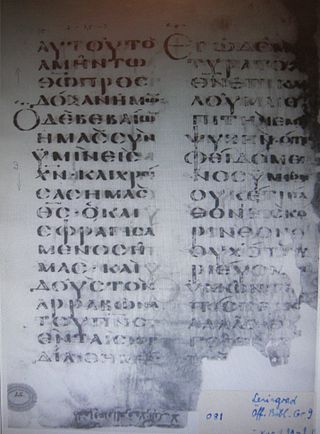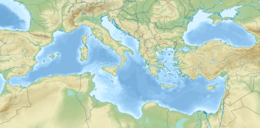
The Epistle to Titus is one of the three pastoral epistles in the New Testament, historically attributed to Paul the Apostle. It is addressed to Saint Titus and describes the requirements and duties of presbyters/bishops.

The Second Epistle to Timothy is one of the three pastoral epistles traditionally attributed to Paul the Apostle. Addressed to Timothy, a fellow missionary, it is traditionally considered to be the last epistle Paul wrote before his death. The original language is Koine Greek.

Tychicus was an Asiatic Christian who, with Trophimus, accompanied the Apostle Paul on a part of his journey from Macedonia to Jerusalem. He is also alluded to have been with Paul in Rome, where the apostle sent him to Ephesus, probably for the purpose of building up and encouraging the church there. In the New Testament, he is mentioned five times.

Ephesians 6 is the sixth chapter of the Epistle to the Ephesians in the New Testament of the Christian Bible. Traditionally, it is believed to be written by Apostle Paul while he was in prison in Rome, but more recently, it is suggested to be written between AD 80 and 100 by another writer using Paul's name and style. This chapter is a part of Paul's exhortation, with the particular section about how Christians should live in their responsibilities as households (5:21–6:9) and in the battle against spiritual forces (6:10–20), with a final benediction to close the epistle (6:21–24).
Acts 20 is the twentieth chapter of the Acts of the Apostles in the Christian New Testament of the Bible. It records the third missionary journey of Paul the Apostle. The narrator and his companions ("we") play an active part in the developments in this chapter. The book containing this chapter is anonymous, but early Christian tradition uniformly affirmed that Luke the Evangelist composed this book as well as the Gospel of Luke.

Romans 12 is the twelfth chapter of the Epistle to the Romans in the New Testament of the Christian Bible. It is authored by Paul the Apostle, while he was in Corinth in the mid-50s AD, with the help of an amanuensis (secretary), Tertius, who adds his own greeting in Romans 16:22. According to Martin Luther,
In chapter 12, St. Paul teaches the true liturgy and makes all Christians priests, so that they may offer, not money or cattle, as priests do in the Law, but their own bodies, by putting their desires to death. Next he describes the outward conduct of Christians whose lives are governed by the Spirit; he tells how they teach, preach, rule, serve, give, suffer, love, live and act toward friend, foe and everyone. These are the works that a Christian does, for, as I have said, faith is not idle.

2 Corinthians 1 is the first chapter of the Second Epistle to the Corinthians in the New Testament of the Christian Bible. It is authored by Paul the Apostle and Timothy in Macedonia in 55–56 CE.

2 Corinthians 2 is the second chapter of the Second Epistle to the Corinthians in the New Testament of the Christian Bible. It is authored by Paul the Apostle and Timothy in Macedonia in 55–56 CE.

2 Corinthians 3 is the third chapter of the Second Epistle to the Corinthians in the New Testament of the Christian Bible. It is authored by Paul the Apostle and Timothy in Macedonia in 55–56 AD/CE. Biblical commentator Heinrich Meyer emphasises that the use of the plural 'we' in 2 Corinthians 3:2 and 2 Corinthians 3:6 includes Timothy in the writing of the letter.

2 Corinthians 4 is the fourth chapter of the Second Epistle to the Corinthians in the New Testament of the Christian Bible. It is authored by Paul the Apostle and Timothy in Macedonia in 55–56 CE. Twice in this chapter this sentence occurs: "Therefore, we do not lose heart".

2 Corinthians 7 is the seventh chapter of the Second Epistle to the Corinthians in the New Testament of the Christian Bible. It is authored by Paul the Apostle and Timothy in Macedonia in 55–56 CE.

2 Corinthians 9 is the ninth chapter of the Second Epistle to the Corinthians in the New Testament of the Christian Bible. It is authored by Paul the Apostle and Timothy in Macedonia in 55–56 CE.

2 Corinthians 10 is the tenth chapter of the Second Epistle to the Corinthians in the New Testament of the Christian Bible. It is authored by Paul the Apostle and Timothy in Macedonia in 55–56 CE. According to theologian Heinrich August Wilhelm Meyer, chapters 10–13 "contain the third chief section of the Epistle, the apostle's polemic vindication of his apostolic dignity and efficiency, and then the conclusion".

2 Corinthians 11 is the eleventh chapter of the Second Epistle to the Corinthians in the New Testament of the Christian Bible. It is authored by Paul the Apostle and Timothy in Macedonia in 55–56 CE. According to theologian Heinrich August Wilhelm Meyer, chapters 10–13 "contain the third chief section of the Epistle, the apostle's polemic vindication of his apostolic dignity and efficiency, and then the conclusion".

2 Corinthians 13 is the thirteenth and final chapter of the Second Epistle to the Corinthians in the New Testament of the Christian Bible. It is authored by Paul the Apostle and Timothy in Macedonia in 55–56 CE.

Galatians 1 is the first chapter of the Epistle to the Galatians in the New Testament of the Christian Bible. It is authored by Paul the Apostle for the churches in Galatia, written between 49 and 58 AD. This chapter contains Paul's significant exposition concerning the significance of what he says is God's revelation of Jesus Christ.

Ephesians 1 is the first chapter of the Epistle to the Ephesians in the New Testament of the Christian Bible. Traditionally, it is believed to have been written by Apostle Paul while he was in prison in Rome, but more recently, it has been suggested that it was written between AD 80 and 100 by another writer using Paul's name and style. This chapter contains the greeting, followed by a section about "The Blessing of God" and Paul's prayer.

Ephesians 4 is the fourth chapter of the Epistle to the Ephesians in the New Testament of the Christian Bible. Traditionally, it is believed to have been written by Apostle Paul while he was in prison in Rome, but more recently, it has been suggested that it was written between AD 80 and 100 by another writer using Paul's name and style. This chapter is a part of Paul's exhortation, with the particular section about the mutual interdependence of the Christians as the church and how they should live in the world (4:17–5:20).

Titus 1 is the first chapter of the Epistle to Titus in the New Testament of the Christian Bible. The letter is traditionally attributed to Paul the Apostle, sent from Nicopolis of Macedonia, addressed to Titus in Crete. Some scholars argue that it is the work of an anonymous follower, written after Paul's death in the first century AD. This chapter contains the greetings and instructions for Titus on dealing with deceivers.

Titus 2 is the second chapter of the Epistle to Titus in the New Testament of the Christian Bible. The letter is traditionally attributed to Paul the Apostle, sent from Nicopolis of Macedonia, addressed to Titus in Crete. Some scholars argue that it is the work of an anonymous follower, written after Paul's death in the first century AD. This chapter describes the qualities of members of the community and doctrinal statements regarding the death of Christ in relation to the removal of sin.











